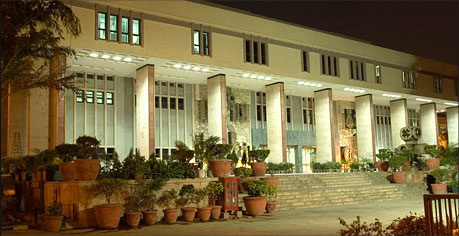“In writ, Court cannot step into the shoes of administrator responsible for formulating tender conditions” says Delhi HC dismissing plea challenging tender conditions of Jan Suvidha Complexes

The Delhi High Court recently dismissed a petition challenging the Eligibility and Turnover Criteria prescribed in 24 Notices Inviting Tenders (NITs) issued by the Delhi Urban Shelter Improvement Board (DUSIB), GNCTD between February 11 to February 15, 2021 for operation, management, and maintenance of Jan Suvidha Complexes.
Dismissing the petition the Division bench of Justice Vipin Sanghi and Justice Rekha Palli said “In writ proceedings, we cannot step into the shoes of the administrator responsible for formulating the tender conditions.”
The observation was made by the bench in a plea filed by an NGO Shakti Jan Sudhar Samiti which submitted that initially these Jan Suvidha complexes were available to the public only on a "Pay and Use" basis, which required them to pay a nominal charge for using the service. However, the DUDIB introduced a „Free User Charge‟Scheme, in pursuance of its decision to make free-of-cost community toilets available to persons living in slums.
A Notice Inviting Quotations (NIQ) was issued on December 19, 2021 for the operation, management and maintenance of such toilet complexes. The NIQ concluded by allotting the work to various NGOs/Societies, including the petitioner . It is the petitioner‟s claim that since its work was found to be satisfactory, DUSIB extended its contract till November 27, 2021.
Thereafter, fresh tenders were invited, which were awarded to private companies instead of NGOs for two years, and now a fresh Tender process has been initiated, vide the impugned 24 NITs from February 11-15, 2021.
According to the petitioner, the system of awarding the work to private companies did not prove to be successful, and thus led to the issuance of the impugned 24 NITs seeking to award the work pertaining to these Jan Suvidha complexes to the NGOs/societies once again.
The petitioner’s main grievance was that the Estimated Cost has been wrongly based on the expenditure envisaged for two years, instead of the expenditure for one year. This threshold criterion, according to the petitioner, is an onerous condition, especially when payments are required to be released by the Respondent on a monthly basis. The inflated Estimated Cost will result in unfair exclusion of a large number of NGOs/Societies, who have the relevant experience in performing similar works. It has been urged that this would not only lead to elimination of many competent bidders, and reduce competition.
Advocate Praveen Chauhan appearing for DUSIB opposing the petition submitted that that no judicial review of the terms of a tender is permissible, unless the terms are found to be arbitrary, discriminatory, or vitiated by malafides.
Having heard the parties the Court observed that “Merely because the threshold criteria in the tenders in question may be higher than what has been laid down in the past in other tenders, the same cannot give a cause to the petitioners to assail the same, or be a reason for this Court to interfere with the same. In writ proceedings, we cannot step into the shoes of the administrator responsible for formulating the tender conditions. The impugned conditions in the NITs do not create unnecessary barriers for the bidders. They are designed to ensure that the bidders who are subsequently awarded the tender, have the resources and capacity to undertake the management of these public washrooms within the city.”
Case Title- Shakti Jan Sudhar Samiti, Delhi vs DUSIB
